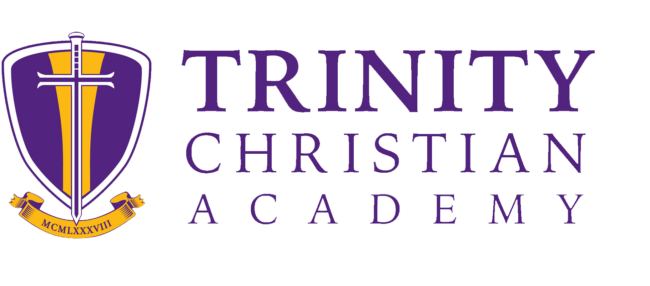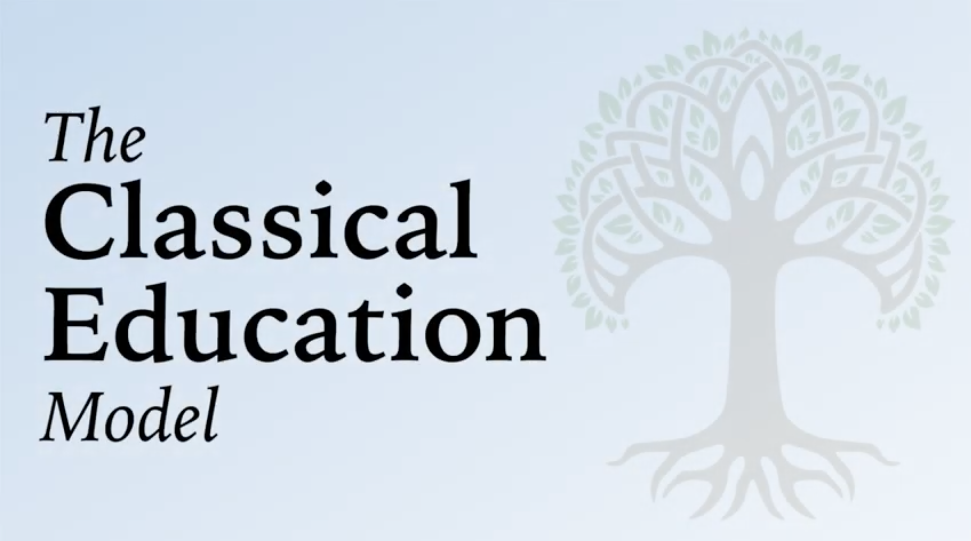What is Classical Education?
At Trinity Christian Academy, we study the past in order to move us forward into the future. Classical education is the resurgence of a time-tested model that cultivates a love of learning. It is an education where students are not simply given information to be reproduced on standardized tests, but instead are trained in the ways of knowledge, wisdom, and virtue. In the classical model, students are educated through the Trivium—three stages of learning coinciding with the natural development of children: Grammar, Logic, and Rhetoric.
The Trivium
Phase 1: Grammar
Grades 2-5
Phase one serves as the foundation of the Trivium model. Children are full of curiosity and a thirst for knowledge. Like little sponges, they are able to learn and retain a wealth of information. We capitalize on this through creative activities, imaginative training, and critical memorization. This phase correlates to the “roots” of the classical tree.
Phase 2: Logic
Grades 6-8
In grades 6 through 8, we take the foundation that was laid in the Grammar phase and begin to explore it. This is the “trunk” and “branches” of the classical tree. At this stage of development, children are naturally argumentative, not in a negative way, but in an explorative way. It’s not enough to simply know information; they want to know the “why” behind information. We capitalize on this inclination through interactive discussions, inquisitive projects, training in formal logic, and the art of critical thinking.
Phase 3: Rhetoric
Grades 9-12
Phase three correlates to the flourishing leaves and fruit of the classical tree. Once students reach high school, we are in the rhetoric stage of classical education. As teenagers, students become far more self-aware and conscious of how they are viewed and what they are communicating, and we tailor their education accordingly. At this point they are not just learning truth; they are owning it as their own though internalization, application, and communication. The culmination of the rhetoric phase is the senior thesis. Students thoroughly research a topic, craft a persuasive hypothesis, and then argue their thesis before a panel of experts.
Grammar

Logic

Rhetoric

Latin
Why?
Many families ask why we teach Latin in grades 3-8 when it is a “dead” language. We see it as very much alive, however, with many benefits to the learner. Latin gives students a better understanding of English vocabulary, forces them to problem solve, sharpens their minds, helps them draw connections to Rome’s rich history and culture, and is the key to Spanish, French, Italian, and the other Romance languages. It is also the root of a great deal of medical, legal, and scientific terminology, making it the perfect starter language.
Noster Finis Trīnitās
Christiana Academia existit ut provideat optimam probatam Christianam educationem Glōriae Chrīstī et beneficiō Caeruleī Grāminis. Noster finis dēclārātur fidē, doctrinā, virtute, civitateque, producens discipulos qui Deum, discendum, bonitatem, aliōsque amant.Trinity Christian Academy...
exists to provide an excellent classical Christian education for the Glory of Christ and the good of the Bluegrass. Our mission is expressed through our core values of faith, scholarship, virtue, and community, producing students who love God, love learning, love goodness, and love one another.Standardized Testing
Assessment of student progress at Trinity is conducted at many levels, from informal formative assessments between teachers and students on content to specific lessons through annual standardized tests comparing students’ progress at Trinity with their peers on a national level. Several standardized assessments to measure and analyze the effectiveness of Trinity’s curriculum are used to ensure students are progressing as desired each year.
Gates-MacGinitie Reading Test (GMRT)
GMRT: This assessment is designed for students in Kindergarten to 2nd grade and aims to measure their reading progress.
CTP-IV (ERB)
CTP-IV (ERB): This assessment is designed for students in 3rd to 8th grade, to measure their progress in reading, math, and language arts.
Pre-ACT
Pre-ACT Test: The assessment evaluates the progress of 9th and 10th-grade students in English, math, reading, and science and provides feedback on potential future career paths. Freshman complete the Pre-ACT 9 and Sophomores take the Pre-ACT.
PSAT
PSAT: This test evaluates the progress of students in grades 9, 10 & 11 in critical reading, mathematics, and writing skills.
ACT
Our students take the ACT at school in the spring of their junior year. Seniors register to take the SAT and/or the ACT during time frames that fit their personal needs. Results are used as part of the college application process. Students can opt to take AP exams in the spring.
Find Out More
Lower Campus
Click here for more information.
Upper Campus
Click here for more information.
Student Services
Click here for more information on our Excel program.
Here’s how to become part of the Trinity family:
1. Schedule a Tour
Meet with our admissions team, tour our facilities, and get a glimpse of our academic, social, and spiritual programs in action.
2. Complete the Application
Submit the necessary materials to begin the enrollment process.
3. Experience the Trinity Community
Join the Trinity family and feel confident that you found the right school for your child.

